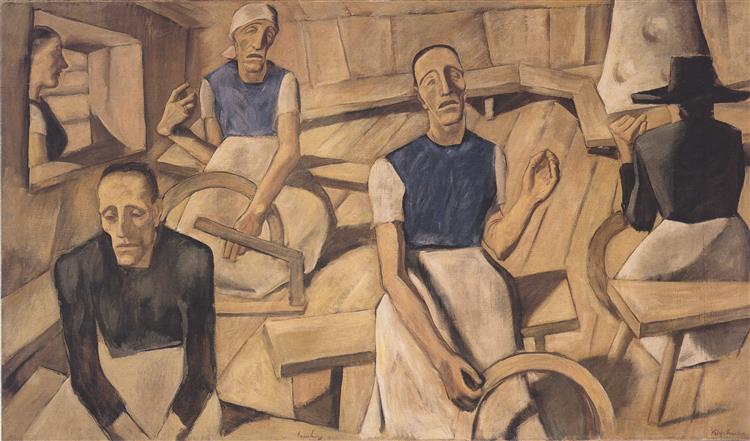Description
The painting "Women of War" by Albin Egger-Lienz, created between 1918 and 1922, is erected as a deep and moving testimony of female experience in times of conflict. This work is part of the context of the end of World War I, a period that significantly determined not only the history of Europe, but also the representation of suffering and resilience in art. Egger-Lienz, an Austrian artist known for his expressionist style and his focus on figuration, capture in this painting the complexity of emotions and human suffering.
From the first glance, the composition stands out for the use of human figures that emerge in a space loaded with tension. Women, who are the undisputed protagonists of the work, reflect a range of expressions that range from sadness to determination. A centralized women's group is presented in the foreground, while more abstract elements are glimpsed, evoking the devastation of war scenarios. This design choice favors the viewer connection with the figures, leading it to share its emotional load and history.
Color plays a crucial role in this work. The palette used by Egger-Lienz includes dark and terrible tones, which are intertwined with brighter nuances, accentuating the feeling of gravity. This not only establishes a dramatic environment, but also highlights the facial expressions and mood of the portrayed women. The atmosphere that is breathed in the work is impregnated with melancholy, as if the figures were trapped at a time that transcends time, symbolizing the collective suffering of women who, to a large extent, were those who suffered the consequences of the war, although they were not directly on the battlefield.
In terms of individuality, figures in "women of war" seem to represent both archetypes and individuals. Each woman, despite the homogeneity in her direction to the viewer, has a uniqueness in her expression that suggests personal stories of loss, resistance and hope. Egger-Lienz thus achieves a balance between the particular and the universal, transforming their figures into symbols of shared suffering.
Egger-Lienz's work is registered within Austrian expressionism, a movement that sought to communicate raw emotions through an aesthetic that often moved away from mere realistic representation. Like other works of his contemporaries, "Women of War" reflects a deep social and emotional restlessness. If we compare this work with other representations of the war in art, such as those of Otto Dix or Kathe Kollwitz, we find parallels in the representation of trauma and suffering, but also a peculiarity in the approach of Egger-Lienz to the portrait of women as a carrier of the emotional load of the war.
In the context of art history, "Women of War" is offered as a reflection on the role of women in society, particularly during turbulent times. The work addresses relevant issues that still resonate today, such as the impact of conflict on everyday life and how women have often been the supports of the home and the family in the midst of devastation. This link between the past and the present underlines the importance of the work, not only as a visual representation, but as a necessary social comment.
Thus, "Women of War" by Albin Egger-Lienz becomes a powerful reminder of the complexities and contradictions of human experience in times of war. Through his technical mastery and his deep understanding of human psychology, Egger-Lienz manages to pay tribute to women who, although they are not always in the center of history, are fundamental in the narration of resistance and collective suffering. The work invites a deep reflection on the cost of war and the significant role of women throughout their narrative.
KUADROS ©, a famous paint on your wall.
Hand-made oil painting reproductions, with the quality of professional artists and the distinctive seal of KUADROS ©.
Art reproduction service with satisfaction guarantee. If you are not completely satisfied with the replica of your painting, we refund your money 100%.

